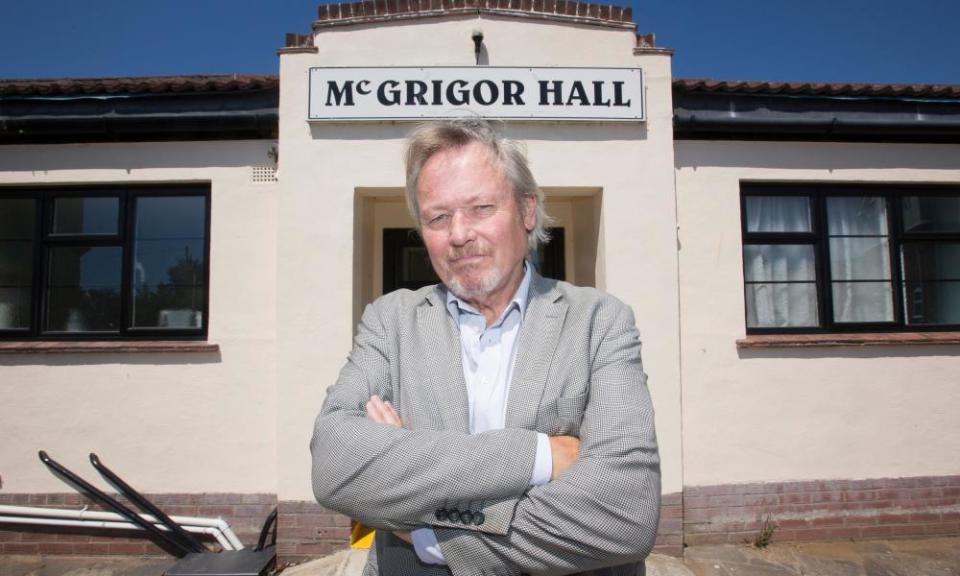British theatres need serious support, says actor turned MP

There are few people in parliament, or even the UK, who know more about regional theatre than the Conservative MP Giles Watling. That is why the actor turned politician is leading a push for the government to save the sector, which he said was weeks from oblivion.
“I’ve worked in pretty much every theatre in the country, not once but on several occasions,” he said. “In 55 years of being a touring actor, you take it all in. But all these wonderful theatres, cultural centres, which bring the performing arts to the people – we are in danger of losing them, and we are in danger of losing them now.”
Watling, who also worked as a director and theatre manager before becoming the MP for Clacton in 2017, has met Rishi Sunak, the chancellor, and the culture secretary, Oliver Dowden, to make his case for an emergency rescue package.
The government has published a “roadmap” to get theatres and other live venues running again after coronavirus, but it contained no promises of new money to tide the sector over.
Related: The UK arts sector was thriving before coronavirus. It's folly not to save it | Polly Toynbee
With even some larger venues such as the Theatre Royal Plymouth and Newcastle Theatre Royal planning likely wholesale redundancies, Watling argued a rescue plan was ideally needed within days rather than weeks.
“We need an announcement of some serious support for the theatre sector,” said the MP, who has also written to Boris Johnson. “We just need to know that something’s coming so that people keep going through these very hard times. Because there are theatres closing.
“A second thing we really need to know is a date, a plan for opening our theatres. If nothing is done by August, then the panto season goes. And, as we all know, the panto season is something that puts money into theatres and supports the rest of the arts.”
Becoming a politician was something of a late career change for Watling, 67, who along with his theatre work is probably best known for a regular role in the 1980s BBC sitcom Bread, and is almost certainly the only politician to have to quit a touring production of Priscilla, Queen of the Desert, to fight a byelection.
Starting out as a child actor on the ITV police drama Gideon’s Way, Watling spent many school holidays on the road with his father, the actor Jack Watling. He later spent a period in the 70s and 80s running the tiny Frinton Summer Theatre, based in a hall just up the coast from Clacton, describing it as “a hand-to-mouth operation” even at the best of times.
Related: UK theatre faces ruin amid coronavirus crisis, say top cultural figures
“You get out and sell the advertising in the programme, you put on the best plays you can for the money available,” he said. “And you pray that the audience is coming. It still has a very loyal audience, but it just will not survive without help.”
It is, Watling noted, a long way from big London theatres: “I suspect the West End will survive. It’ll be impoverished, but it will come through. You have the Palladium with 2,000 seats. If you have 1,000 people, and you charge a little bit more – and they will pay in the West End – you can probably make it.”
Watling is urging ministers to consider the long-term cultural impact of losing theatres like that in Frinton, where actors including Antony Sher made their debuts, as well as the economic boost from overseas cultural capital.
“Under the late Derek Nimmo, I toured the world,” he said. “We played to packed houses everywhere we went, and they were looking at British theatre, British values. It’s extraordinarily valuable, much more valuable than £13.7bn it’s worth on paper.”
Watling, who met Dowden on Wednesday, said he hoped ministers were listening: “People are beginning to understand just how valuable this is, and how how much in danger it is. And how historically important it is. Ever since the time of Shakespeare, we’ve been exporting the English language and English values across the world, through our theatre. And we’ve now come to a point where Rome is burned around us – the theatres are closing.”

 Yahoo News
Yahoo News 